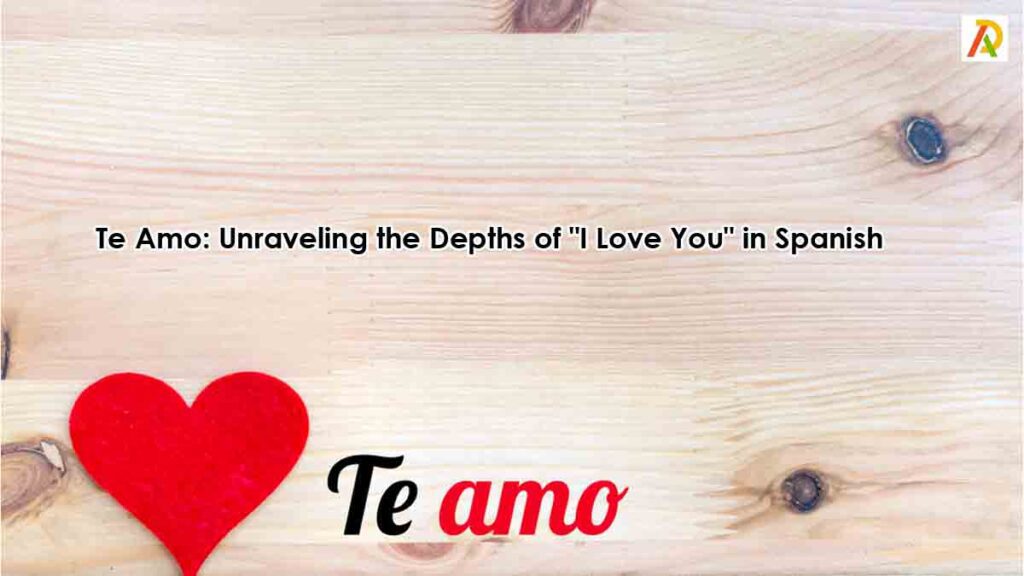Te Amo: Unraveling the Depths of “I Love You” in Spanish

Language is a magnificent tapestry that weaves culture, emotions, and human connection together. Among the myriad expressions of affection, “Te amo” stands out as a phrase that transcends linguistic barriers and resonates with profound meaning. In this exploration, we delve into the layers of “Te Amo“. We will understand its significance, its translation to “I love you” in Spanish and its resonance in the English-speaking world. The phrase carries the enduring power of expressing love through language.
Te Amo Meaning: Love Beyond Words
“Te amo” is a Spanish phrase that encapsulates a deep, heartfelt declaration of love. Its emotional depth reaches beyond the mere utterance of “I love you,” embodying the sentiments of adoration, passion, and intimacy. With each syllable, “Te amo” encapsulates the essence of devotion, evoking a spectrum of feelings that words alone might fail to convey. This phrase is not confined to romantic love alone. Rather, it extends to familial bonds, friendships, and the connections that make life meaningful.
Understanding “Te Amo” Meaning: Unraveling its Depth
Language is the vessel through which we convey our emotions, thoughts, and desires. Among its myriad expressions, “Te amo” stands as a potent testament to the complexity of human emotions, specifically the depth of love. In this exploration, we delve into the nuanced meaning of “Te Amo“. We will focus on its emotional resonance and the cultural and linguistic aspects that make it a universal declaration of affection.
Te Amo Meaning: Linguistic Nuances
While “I love you” effectively communicates love in English, “Te amo” is endowed with a certain emotional richness that words alone struggle to convey. The Spanish language, with its intricate structure and melodious cadence, infuses “Te amo” with an elevated emotional resonance. The phrase resonates not just as a declaration but as a melody that echoes in the heart. It stirs up a multitude of sensations and memories associated with the feeling of love.
Te Amo Meaning: Cultural Context
“Te amo” is not just a linguistic expression. It’s a cultural touchstone that reflects the passion and romanticism found within Spanish-speaking cultures. It conjures images of fiery dances, intimate embraces, and poetic confessions. The phrase is deeply interwoven with the cultural tapestry of regions where people speak Spanish. It embodies the spirit of ardor that characterizes these societies. “Te amo” is a reminder of the emotional vibrancy present in these cultures. It offers a glimpse into the intricate connections between language and identity.
Depth Beyond Romantic Love
While often associated with romantic relationships, “Te amo” extends its embrace beyond the realm of romance. It is a versatile phrase that envelops the love shared between family members, friends, and even places. The significance of “Te amo” extends to encompass the feelings of admiration, respect, and compassion that bind humans together. Its versatility makes it a bridge that connects individuals across various contexts. It reminds us of the intricate web of relationships that shape our lives.
A Profound Whisper
The act of uttering “Te amo” carries an inherent sense of intimacy. The gentle “Te” followed by the heartfelt “amo” creates a rhythm that resonates deeply with the listener. The way anyone speaks it—whether in a hushed whisper or a fervent declaration—contributes to the layers of meaning it conveys. It’s a phrase that holds the power to inspire both vulnerability and strength. How people utter it can amplify its emotional impact.
The Timelessness of “Te Amo”
Currently, technological advances and rapid communication drive the world. The enduring resonance of “Te amo” stands as a testament to the timeless nature of human emotions. It transcends generations, cultures, and geographic borders, serving as a bridge that connects people through the language of the heart. It reminds us that amid the complexities of modern life, the essence of love remains an unwavering constant.
In conclusion, “Te amo” is not merely a phrase. It is an embodiment of the complexity and depth of human emotion. It transcends linguistic barriers and cultural differences, serving as a universal expression of love and affection. Whether whispered in a quiet moment or proclaimed with unwavering passion, “Te amo” continues to resonate as a declaration that captures the essence of the human experience. It echoes our capacity to connect, cherish, and express the most profound emotions that define us as beings capable of love.
I Love You in Spanish: Translating Te Amo
“I love you” is a translation of the Spanish phrase “Te amo.” However, as with many translations, mere words cannot fully capture the true essence of the phrase. “I love you” may convey the sentiment, but it lacks the cultural and emotional nuances present in “Te amo.” The Spanish language has an uncanny ability to infuse emotions into its words. “Te amo” or I love you in Spanish is no exception. It’s a testament to the depth of human emotions and the power of language to communicate these feelings across cultures.
Language possesses the remarkable ability to convey emotions, connect hearts, and bridge cultures. When it comes to expressing love, “Te amo” or I love you in Spanish shines as a gem within the Spanish language. In this exploration, we delve into the nuances of this timeless declaration, its cultural significance, and the emotions it encapsulates.
“Te Amo” Defined
“Te amo” resonates as a universal phrase, transcending borders and languages. In the realm of emotions, it signifies a profound affection that words alone often fail to capture. These two simple words carry a weight of sentiment that traverses the spectrum from a deep attachment to romantic passion. “Te amo” or I love you in Spanish signifies a connection that binds individuals in ways that are intimate, emotional, and sincere.
Cultural Significance
In the rich tapestry of Spanish-speaking cultures, “Te amo” carries layers of tradition and heritage. It is not a mere translation of “I love you” in Spanish but a unique expression that embodies the soul of romance and adoration. The fiery passion of Spanish culture is deeply embedded in these words. They evoke imagery of flamenco dances, passionate embraces, and poetic declarations. “Te amo” stands as a testament to the emotional depth that infuses Hispanic societies, where people often celebrate feelings with fervor.
Expressions Beyond Romance
While we often associate “Te amo” with romantic love, its versatility extends to other relationships as well. Families use it to express unconditional love between parents and children, siblings, and even dear friends. This versatility makes “Te amo” a universal phrase that transcends narrow definitions. It underscores the profound bonds that tie people together across various contexts.
The Weight of Pronunciation
The pronunciation of “Te amo” itself is an embodiment of the emotions it carries. The soft, lilting “Te” and the heartfelt resonance of “amo” create a melody that reverberates in the heart. The way people speak these words can convey nuances that mirror the depth of one’s emotions, whether whispered tenderly or declared with unwavering passion.
The Depth of Emotion
“I love you” is a sentiment that has a universal feel, but “Te amo” brings a distinct touch. The Spanish language, known for its ability to evoke emotions, lends a special charm to this phrase. It encapsulates not only love but also admiration, fondness, and an intimate connection that words struggle to define. “Te amo” is a declaration that encapsulates the essence of devotion, endearment, and desire for someone’s happiness.
In conclusion, “Te amo” transcends being a mere translation of “I love you” in Spanish. It encapsulates the beauty of language, culture, and emotion. It weaves them together into a tapestry of affection. Whether whispered in a romantic moment, exchanged between family members, or shared among close friends, “Te amo” resonates with authenticity and depth. Through this phrase, we get the prompt of the power of language to express the most profound and cherished emotions that enrich our lives.
Te Amo in English: Bridging the Linguistic Gap
When “Te amo” crosses linguistic borders and enters the English-speaking world as “I love you,” it still carries a certain mystique. While the literal translation is there, the nuances and associations tied to the original Spanish phrase come along. This linguistic transformation adds an exotic touch. It turns the phrase into something that evokes thoughts of sunsets on Mediterranean shores and passionate flamenco dances. It’s a window into the Spanish-speaking world’s rich tapestry of emotions and its unique way of expressing affection.
The Enduring Power of Expressing Love
The expression “Te amo” in English or “I love you” carries timeless significance. In a world where technology has enabled instantaneous communication, the potency of these words remains undiminished. Whether whispered in a quiet moment or boldly declared in the presence of a crowd, “Te amo” signifies a connection that is deep and eternal. This phrase becomes a foundation for relationships. It anchors them in the profound feelings that sustain and nourish human connections.
“Te Amo” Unveiled: Exploring the Heartfelt Depth of the Spanish Expression
Language has the extraordinary ability to convey the most intricate of emotions. Among its many gems, “Te amo” shines as a testament to the universal language of love. In this exploration, we delve into the exquisite nuances of te amo in English as “I love you”. We will study the cultural resonance it carries, and its enduring impact on human relationships.
The Essence of “Te Amo”
“Te amo,” a phrase originating from the Spanish language, transcends mere words. It represents an emotion so profound that it resonates across cultures, evoking feelings of love, adoration, and connection. These two simple words encapsulate a spectrum of emotions that range from the tenderness of affection to the intensity of passion. “Te amo” is a declaration that reverberates with sincerity and vulnerability. It holds the desire to express a deep-seated attachment to another person.
From Spanish to English: “I Love You”
While “Te amo” translates to “I love you” in English, the transition between languages fails to capture the full essence of the original phrase. In Spanish, “Te amo” carries a depth that extends beyond verbal communication. It signifies a profound connection and emotional investment that words alone cannot entirely convey. The English translation, though heartfelt, lacks the cultural and linguistic intricacies that make “Te amo” so evocative in its native tongue.
Cultural Echoes
“Te amo” reflects the passion and romanticism deeply rooted in Spanish-speaking cultures. It conjures images of vibrant landscapes, passionate dances, and poetic expressions of affection. The phrase intertwines with the cultural tapestry of Spanish-speaking regions, embodying the spirit of ardor and connection that characterizes these societies. “Te amo” is not just a linguistic expression. It carries with it a sense of cultural identity, infusing every declaration with the colors of tradition and heritage.
Beyond Romantic Love
While “Te amo” is often synonymous with romantic love, its significance extends beyond romantic relationships. It serves as a versatile phrase that encompasses the love shared between friends, family members, and even places. It becomes a bridge between individuals, a sentiment that fosters unity, understanding, and empathy. The phrase’s adaptability makes it an essential thread in the fabric of human connections.
Whispered Melody
The mere act of uttering “Te amo” holds a captivating allure. The gentle roll of the “T” and the melodious “amo” create a symphony that resonates with the heart’s deepest chambers. It is a phrase that lovers can speak softly in moments of intimacy or shout joyfully in the presence of loved ones. However, its impact remains consistently profound.
The Timeless Legacy
“Te amo” stands as a testament to the enduring power of language in expressing emotions that transcend time and space. In an era where communication is often brief and digitalized, this phrase reminds us of the significance of heartfelt, authentic expressions. It is a declaration that transcends generations, leaving an indelible mark on the collective human experience.
“Te amo” is more than a mere phrase. It’s an encapsulation of the universal language of love. Through its evocative beauty, cultural significance, and ability to traverse linguistic barriers, it serves as a reminder of the boundless depth of human emotion. Whether lovers speak it softly or declare with passion, “Te amo” continues to weave an intricate tapestry of love. It connects hearts and enriches relationships across the world.
Conclusion
In the tapestry of human emotions, “Te amo” emerges as a brilliant thread that weaves the sentiment of love into the fabric of our lives. Beyond its linguistic representation as “I love you” in Spanish, it embodies the essence of affection, adoration, and connection. This phrase transcends linguistic boundaries and finds its place in various cultures and languages. It continues to inspire a profound understanding of what it means to love and be loved. In a world where words can sometimes fall short, “Te amo” stands as a testament to the enduring power of language to encapsulate the most profound emotions known to humanity.


